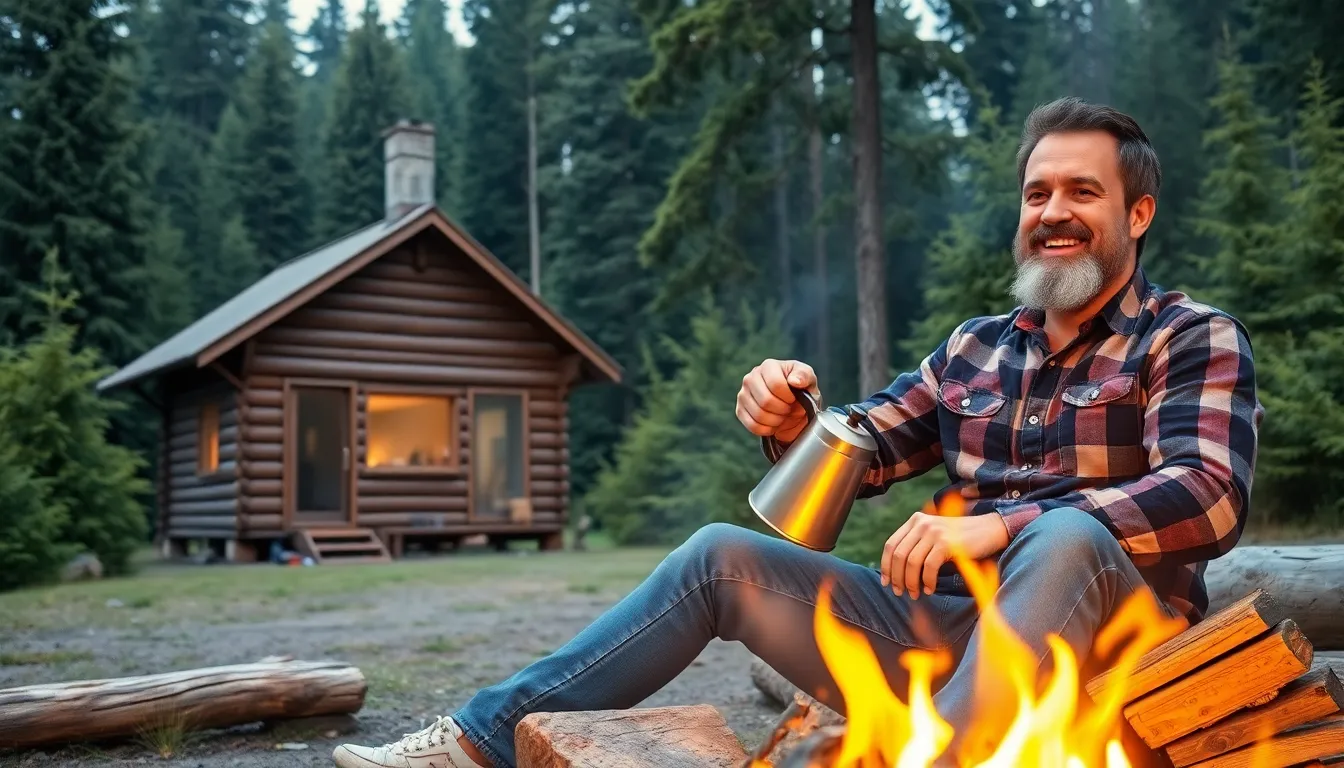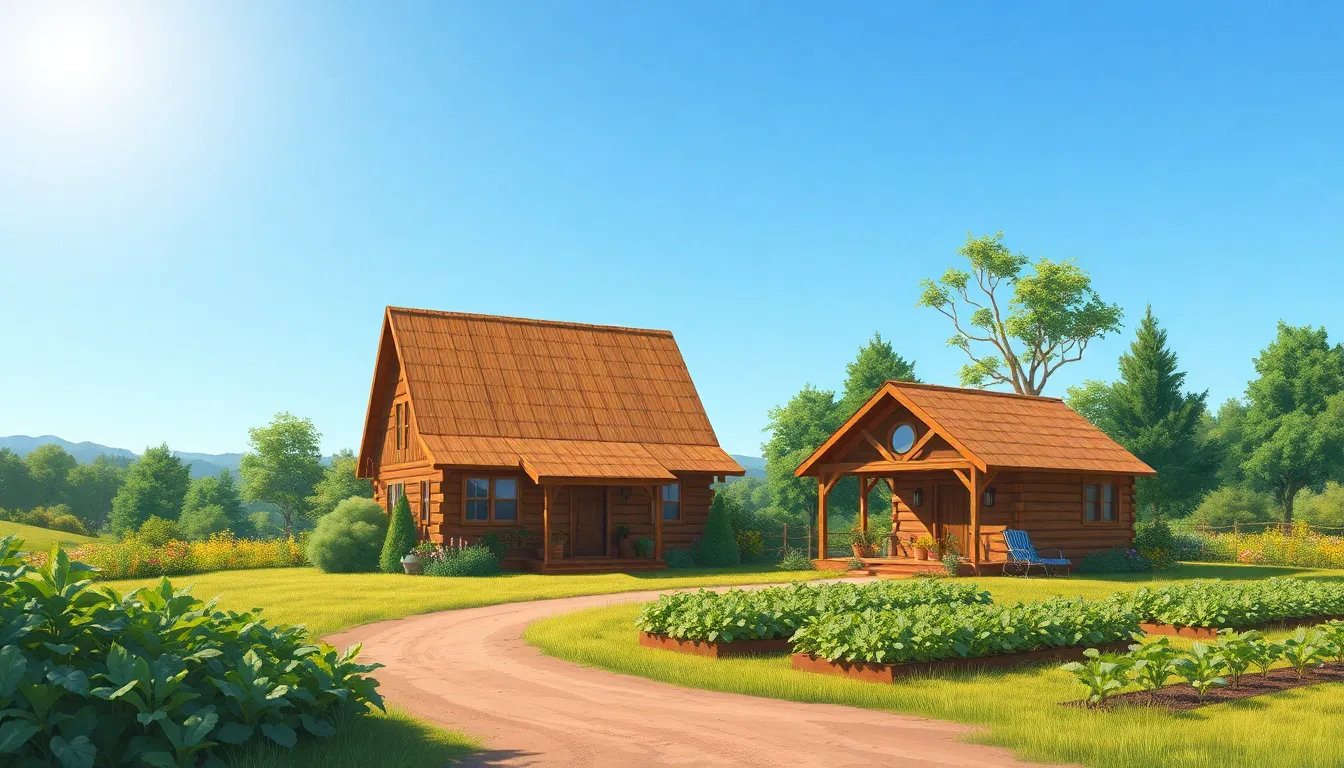Physical Address
304 North Cardinal St.
Dorchester Center, MA 02124
Physical Address
304 North Cardinal St.
Dorchester Center, MA 02124

In a world buzzing with notifications and endless to-do lists, the dream of off-grid living is more appealing than ever. Imagine waking up to the sound of birds instead of alarms and sipping coffee brewed over a campfire instead of a Keurig. It’s not just a fantasy; it’s a lifestyle choice that more people are embracing. But where should one set up their off-grid paradise?
Some states shine brighter than others when it comes to off-grid living. From the sun-soaked deserts of Arizona to the lush forests of Oregon, these states offer the perfect blend of natural resources, friendly regulations, and a community of like-minded individuals. So pack your bags, grab your favorite survival guide, and get ready to explore the best states for living life unplugged. After all, who wouldn’t want to swap Wi-Fi for wildlife?
Off-grid living emphasizes self-sufficiency and sustainable practices separate from public utilities. Individuals choose this lifestyle for various reasons, including reducing environmental impact, increasing autonomy, and simplifying life. Many find a sense of freedom in disconnecting from conventional power sources and relying on renewable energy options like solar or wind.
Living off the grid often involves developing skills in farming, gardening, and water conservation, enhancing a connection to nature. Communities supporting off-grid living thrive, with shared knowledge fostering collaboration. States such as Arizona and Oregon frequently emerge as prime locations due to favorable climates, abundant natural resources, and existing networks of off-grid enthusiasts.
Regulations also influence the viability of off-grid living. Some states promote zoning laws that encourage alternative energy use, while others impose restrictions that may limit independent arrangements. States with supportive legislation can significantly ease the transition to off-grid lifestyles.
Individuals seeking to embrace off-grid living should consider local wildlife, climate patterns, and community resources. These factors play a vital role in establishing a sustainable off-grid existence, ensuring a harmonious relationship with the surrounding environment. States that offer vast lands, access to fresh water, and favorable weather conditions become ideal for off-grid projects.
Researching different states provides insights into opportunities and challenges inherent in off-grid living. Knowledge about local resources can guide potential off-grid citizens in making informed decisions about their future.

Individuals planning for off-grid living should evaluate several key factors to maximize their self-sufficiency and comfort. These elements significantly influence both the feasibility and enjoyment of the off-grid lifestyle.
Weather patterns fundamentally impact off-grid living. Warm climates can support year-round gardening, while cooler areas may necessitate additional heating solutions. Rainfall frequency influences water availability, making states with reliable precipitation appealing for self-sufficient living. Seasonal variations also dictate energy needs, particularly related to renewable sources like solar and wind. Evaluating climate helps determine suitable energy solutions and crops.
Access to affordable land is crucial for off-grid living. Certain states offer larger parcels at lower prices, while urban areas tend to raise real estate costs significantly. Checking property types, including raw land and established homesteads, is vital. Availability of resources, such as timber and water, enhances a land parcel’s desirability. Prioritizing land affordability and usability aids individuals in selecting the ideal location for their off-grid aspirations.
Understanding legal regulations is essential for off-grid living. Some states promote flexible zoning laws that support alternative energy systems, while others impose strict regulations limiting independence. Researching local ordinances helps individuals navigate property rights and build codes. Permits may also be necessary for structures, water usage, or waste disposal. Awareness of these legal frameworks fosters a smoother transition into off-grid life.
Several states offer unique advantages for off-grid living, catering to those seeking a sustainable and self-sufficient lifestyle.
Alaska presents vast landscapes ideal for off-grid living. With abundant natural resources, residents harness solar and wind energy effectively. The state’s low population density allows for plenty of space, fostering a strong sense of community. Long summers provide extended sunlight for energy production, while winter conditions encourage preparation and planning. Regulations around off-grid setups are relatively loose, fostering innovation and individual initiatives.
Vermont features rich soil and a commitment to sustainability, making it a prime choice for off-grid enthusiasts. The climate supports diverse agriculture and encourages self-reliance through gardening. A community focused on environmental stewardship nurtures those living off the grid. Residents utilize renewable energy sources, including solar and biomass, promoting energy independence. Zoning laws generally respect off-grid setups, easing the process for aspiring homesteaders.
Oregon boasts a variety of climates and landscapes conducive to off-grid living. The state’s emphasis on sustainability attracts like-minded individuals. Renewable energy options thrive, with many residents successfully using solar panels and wind turbines. Access to water sources supports gardening and livestock, enhancing self-sufficiency. Regulations favor alternative energy systems, facilitating an easier transition to off-grid lifestyles.
Tennessee offers affordable land and a moderate climate, suitable for off-grid living. Many find the state’s natural resources promote self-reliance, especially in farming and gardening. A supportive community exists for those pursuing sustainable practices. Renewable energy options, including solar and hydro, remain popular among residents. Zoning regulations encourage diverse living arrangements, allowing flexibility in off-grid setups.
New Mexico features a unique desert landscape that supports off-grid living. High solar potential enables effective energy production, appealing to many residents. The state’s strong culture of self-sufficiency fosters community ties among those living off-grid. Water conservation practices become essential in the arid climate, prompting innovative solutions. Overall, regulations surrounding off-grid living remain favorable, allowing individuals to pursue this lifestyle more easily.
Access to essential resources enhances the experience of off-grid living. High-quality tools are a must for gardening and farming; look for items like composters, seed suppliers, and hand tools. Direct purchases from local farmers or co-ops support community sustainability and provide fresh produce.
Online platforms offer invaluable information. Many websites focus on renewable energy systems, showcasing solar panel options and wind turbine installations. Others provide guidelines on adhering to legal regulations and zoning laws across different states.
Books about off-grid living serve as another beneficial resource. They cover topics such as water conservation, sustainable building, and permaculture techniques. Furthermore, podcasts about self-sufficiency and eco-friendly practices engage listeners with expert insights and personal stories.
Local workshops on off-grid skills boost knowledge and confidence. Attending these events connects individuals with experienced off-grid enthusiasts, fostering a community of support. Additionally, volunteer opportunities may arise, allowing people to gain hands-on experience while contributing to a collective goal.
Social media groups provide platforms for sharing tips and experiences. Members often exchange resources, advice, and expertise, creating an informal network of support. Engaging with these online communities facilitates the continuation of learning about best practices in off-grid living.
Numerous resources exist for those embracing off-grid lifestyles. By utilizing tools, online platforms, educational materials, workshops, and social media, individuals can strengthen their off-grid living practices while forming vital connections with others who share their interests.
Embracing off-grid living offers a rewarding path toward self-sufficiency and a deeper connection with nature. The right state can significantly enhance this lifestyle, providing the resources and community support needed to thrive. By carefully considering factors like climate, land affordability, and local regulations, individuals can find their ideal off-grid haven.
As more people seek to simplify their lives and minimize their environmental impact, the appeal of off-grid living continues to grow. With the right knowledge and tools, anyone can embark on this journey, fostering a sustainable future while enjoying the freedom that comes with independence.